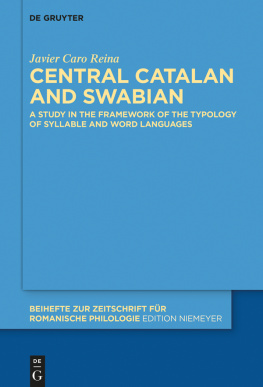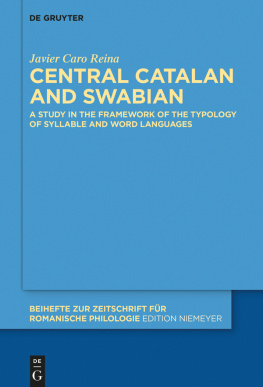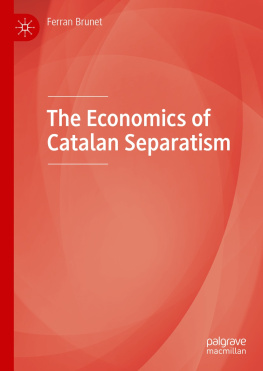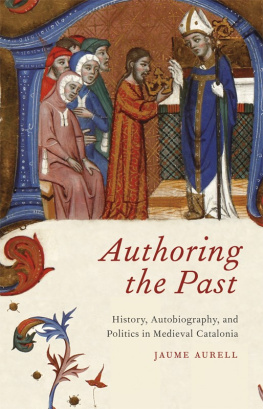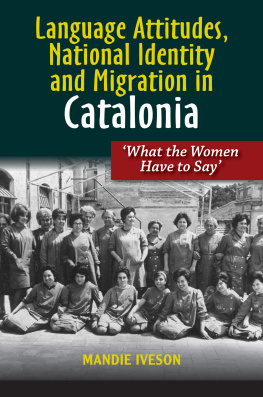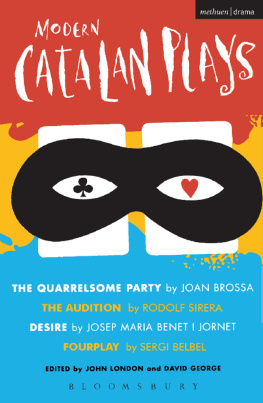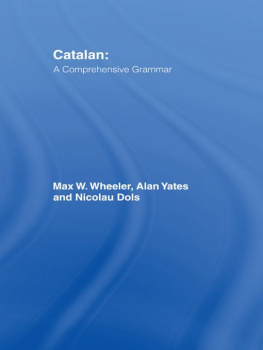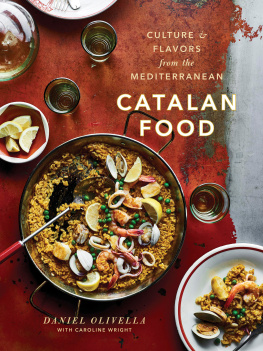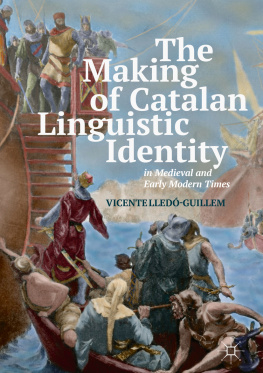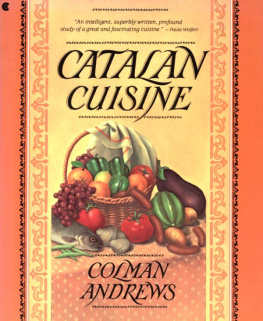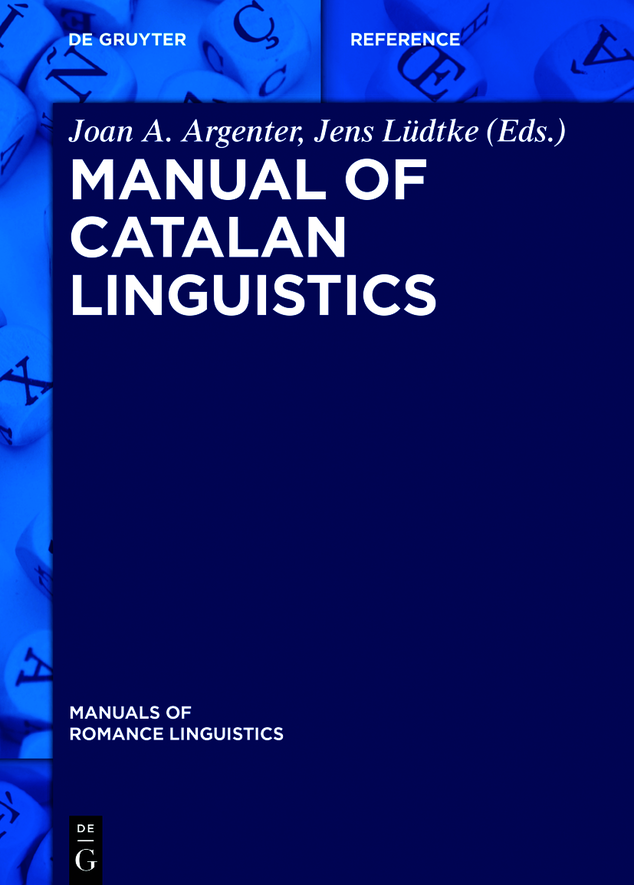Manuals of Romance Linguistics
Edited by
Gnter Holtus
Fernando Snchez-Miret
Volume
ISBN 9783110448252
e-ISBN (PDF) 9783110450408
e-ISBN (EPUB) 9783110448313
Bibliographic information published by the Deutsche Nationalbibliothek
The Deutsche Nationalbibliothek lists this publication in the Deutsche Nationalbibliografie; detailed bibliographic data are available on the Internet at http://dnb.dnb.de.
2020 Walter de Gruyter GmbH, Berlin/Boston
Manuals of Romance Linguistics
The new international handbook series Manuals of Romance Linguistics (MRL) will offer an extensive, systematic and state-of-the-art overview of linguistic research in the entire field of present-day Romance Studies.
MRL aims to update and expand the contents of the two major reference works available to date: Lexikon der Romanistischen Linguistik (LRL) (19882005, vol. 18) and Romanische Sprachgeschichte (RSG) (20032008, vol. 13). It will also seek to integrate new research trends as well as topics that have not yet been explored systematically.
Given that a complete revision of LRL and RSG would not be feasible, at least not in a sensible timeframe, the MRL editors have opted for a modular approach that is much more flexible:
The series will include approximately 60 volumes (each comprised of approx. 400600 pages and 1530 chapters). Each volume will focus on the most central aspects of its topic in a clear and structured manner. As a series, the volumes will cover the entire field of present-day Romance Linguistics, but they can also be used individually. Given that the work on individual MRL volumes will be nowhere near as time-consuming as that on a major reference work in the style of LRL, it will be much easier to take into account even the most recent trends and developments in linguistic research.
MRLs languages of publication are French, Spanish, Italian, English and, in exceptional cases, Portuguese. Each volume will consistently be written in only one of these languages. In each case, the choice of language will depend on the specific topic. English will be used for topics that are of more general relevance beyond the field of Romance Studies (for example Manual of Language Acquisition or Manual of Romance Languages in the Media).
The focus of each volume will be either (1) on one specific language or (2) on one specific research field. Concerning volumes of the first type, each of the Romance languages including Romance-based creoles will be discussed in a separate volume. A particularly strong focus will be placed on the smaller languages (linguae minores) that other reference works have not treated extensively. MRL will comprise volumes on Friulian, Corsican, Galician, among others, as well as a Manual of Judaeo-Romance Linguistics and Philology.Volumes of the second type will be devoted to the systematic presentation of all traditional and new fields of Romance Linguistics, with the research methods of Romance Linguistics being discussed in a separate volume. Dynamic new research fields and trends will yet again be of particular interest, because although they have become increasingly important in both research and teaching, older reference works have not dealt with them at all or touched upon them only tangentially. MRL will feature volumes dedicated to research fields such as Grammatical Interfaces, Youth Language Research, Urban Varieties, Computational Linguistics, Neurolinguistics, Sign Languages or Forensic Linguistics. Each volume will offer a structured and informative, easy-to-read overview of the history of research as well as of recent research trends.
We are delighted that internationally-renowned colleagues from a variety of Romance-speaking countries and beyond have agreed to collaborate on this series and take on the editorship of individual MRL volumes. Thanks to the expertise of the volume editors responsible for the concept and structure of their volumes, as well as for the selection of suitable authors, MRL will not only summarize the current state of knowledge in Romance Linguistics, but will also present much new information and recent research results.
As a whole, the MRL series will present a panorama of the discipline that is both extensive and up-to-date, providing interesting and relevant information and useful orientation for every reader, with detailed coverage of specific topics as well as general overviews of present-day Romance Linguistics. We believe that the series will offer a fresh, innovative approach, suited to adequately map the constant advancement of our discipline.
Gnter Holtus (Lohra/Gttingen)
Fernando Snchez-Miret (Salamanca)
July 2019
Acknowledgements
The genesis of the present work dates back to 2013, when the series editors proposed to Jens Ldtke the creation of a Manual of Catalan Linguistics. In 1984 Jens had published an introduction to Catalan linguistics for a German-speaking readership (Katalanisch. Eine einfhrende Beschreibung), which provided an overview of the field to meet the growing interest of scholars, students and the general public in the Catalan language. No similar publication existed at the time and the book soon achieved a significant circulation among both students and scholars. By 2013, it had been long out of print, and a new edition would have required a complete revision. This led Jens to accept the series editors offer, with the aim of providing deeper and updated insights into Catalan linguistics to an even broader readership.
Two questions remained open: whether Jens would be the sole editor of the manual and what would be the language of publication. Jens invited me to get involved early in the project, and I first did so in an advisory role, providing suggestions for the design of the work, topics and authors. As our cooperation on this project grew closer, I received a formal invitation from the publisher and ultimately accepted the role of co-editor. Regarding the language of publication, Jens opted for English, in agreement with the series editors and the publisher, and in keeping with the aim of reaching the largest possible audience.
Unfortunately, Jens Ldtke passed away on 4th January 2019. After two years of working side by side, I was left to complete our shared mission alone. I was determined to complete the work we had started together. Thirty-five years after his Einfhrung, this Manual of Catalan Linguistics pays tribute to Jens fruitful career.
I would like to thank Jens for his continuous advice and dedication and for never losing hope and good humour even in the most difficult situations. He dedicated all his energy to this project but, tragically, passed away before he could see the manual in print.
My thanks go to the publishing house and the editors of the Manuals of Romance Linguistics series. Without their encouragement and support, I would not have been able to shoulder this new responsibility alone. I would particularly like to thank Dr. Ulrike Krau for her trust in me and Gabrielle Cornefert for her editorial assistance, as well as Gnter Holtus and Fernando Snchez-Miret, series editors, for their careful supervision of the texts. I must also express our appreciation for the assistance provided by Erin Goldfinch, who revised some of the authors originals in English and brought them into good stylistic shape. I know that Jens Ldtke would have expressed similar acknowledgements. I would like to express deep gratitude to Monika Ldtke, for sharing Jens material without hesitation and reviewing a preliminary version of the Introduction.


